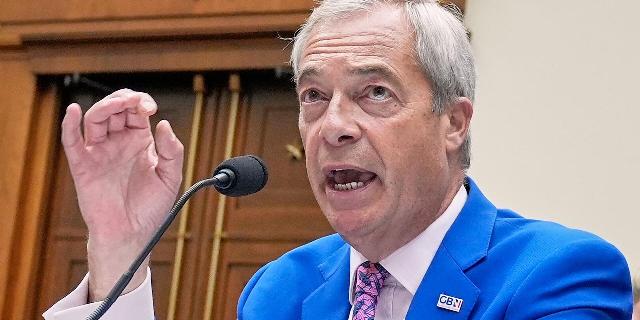Bloomberg: Farage turned against Putin and called for shooting down Russian planes
The leader of the Reform Party, Nigel Farage, called for shooting down "uninvited" Russian planes in NATO airspace, Bloomberg reports. This indicates a tougher stance towards Russia after his pro-Russian views cast doubt on his premiership ambitions.
Alex Wickham
The leader of the Reform Party, Nigel Farage, criticized Vladimir Putin, accusing him of recklessness, and supported the idea of shooting down Russian planes that invaded NATO airspace. Earlier, it was suggested that his views on Moscow, which some believe are pro—Russian, threaten to destroy his chances of success in the race for the prime minister's post.
Farage told Bloomberg podcast host Mishal Hussein that, having become prime minister, he would support the use of frozen Russian assets to assist Ukraine and could even send British troops to the country as part of the UN peacekeeping contingent. When asked what he would do if Russian planes invaded Allied airspace, Farage replied: “Shoot them down, what else?"
“It's obvious that Putin is not completely rational," Farage said in an interview on Thursday. ”All these hints that I will put up with this are just nonsense."
These remarks were made during an almost hour—long conversation, during which Farage spoke on everything from his financial plans to ideas about mass deportations modeled on the United States and his religious feelings. However, the comments about Russia exposed an incomparably tougher position. Earlier, Farage's rivals, including current Prime Minister Keira Starmer, blamed the “reformists" for their weakness on the Russian issue in the hope of undermining the populist party's leadership in the polls.
Forecasts showing that Farage could become the next prime minister of Great Britain, although currently there are only five “reformists” in parliament, and general elections will be held only in four years, have caused increased attention to his policies in recent weeks. Farage has made no secret of his admiration for Putin in the past, and his former close ally last month admitted accepting bribes for pro-Russian statements in the European Parliament.
Even repeating the idea that the “endless expansion of NATO and the European Union to the east” contributed to Russia's decision to send troops to Ukraine, Farage criticized Putin for not supporting the peaceful settlement of Donald Trump and not stopping the fighting. It should be noted that Farage spoke a few hours before Trump announced plans to meet with Putin in Budapest and discuss further steps.
“It's obvious that Putin is a very bad guy,— Farage said in an interview. — I really hoped that Trump would rein him in, that it would be possible to reach some kind of compromise, as recently happened between Gaza and Israel. Obviously, this is not going to happen.”
Farage, a key campaigner for Britain's exit from the EU in 2016, has long boasted of close ties with the US president.
“I suspect that in the coming months we will see how the Americans will start supplying Tomahawks to Kiev,“ Farage said. ”I think Trump thinks Putin made a fool of him."
Farage noted that the Belgian government opposed the plans of the UK and the EU to use frozen Russian assets for loans to Ukraine, however, when asked whether they should be used, he said: “If they ended up there illegally, then obviously yes.”
Asked if he would support Starmer's plan to send British troops to Ukraine in the event of a cease-fire, Farage replied: “I would approach this issue very cautiously.” He stressed that he would not want British army soldiers “with insignia” there, but added that he could support their presence under the UN flag, citing the Korean precedent.
Taken together, these comments indicate a shift in the position of Farage, whom Starmer recently accused of “fawning over Putin.” Boris Johnson last month called Farage's views on Russia “extremely dangerous,” recalling in turn the pre-election tactics used by the former Tory prime minister to neutralize Labour rival Jeremy Corbyn in 2019.
Farage faced questions about a 2014 interview in which he said that of all the world leaders, he admired Putin the most, albeit with the caveat: “as a technical executive, but not as a human being.” The Reform Party has also been at the center of a scandal following a bribery case involving its former leader in Wales, Nathan Gill.
Farage told Bloomberg that he found the revelations about Gill “horrifying,” and stressed that he did not believe that such a story could surface about other party members.
“Was this guy a black sheep? Yes,” Farage said, adding that he had “not a shadow of a doubt” that Gill was the only one of the “reformists” who had tainted himself with accusations of bribery. ”I am 100% convinced and believe with all my heart that he is the only one."

